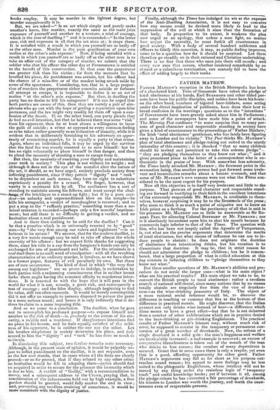FATHER MATHEW.
FATHER MATHEW'S reception in the British Metropolis has been of a checkered kind. Tens of thousands have taken the pledge of total abstinence at his bands, Earl STANHOPE and other titled per- sons have been his public disciples, and nobles have been his hosts : on the other hand, numbers of bigoted beer-bibbers, some acting under the direct inspiration of publicans, have done their best to breed confusion in his meetings ; questions as to the "intentions" of Government have been gravely asked about him in Parliament ; and some of the newspapers have made him a point of attack. The Morning Post confesses "to some surprise that so many per- sons of good character and respectable standing in society have given a kind of countenance to the proceedings of Father Mathew,' the Irish total abstinence' gentleman, who has lately been figuring away in London and its vicinity." The Post thinks Mr. MATHEW'S plan of total abstinence and pledge-taking not suited to the sturdy rationality of this country ; it is shocked "that so many children should be invited and permitted to take this solemn pledge"-- " they are pledging themselves to they know not what ; " and it gives prominent place to the letter of a correspondent who is en- thusiastic in the praise of beer. With somewhat less solemnity, the Times lately attacked Mr. MATHEW; the foremost point its the accusation being, that another person had put fbrward some irrele- vant and inconclusive remarks about a human stomach, and that some of Mr. Marusw's own reasons were not what the Times con- sidered to be the most cogent for his purpose. Now all this objection is in itself very irrelevant and little to the purpose. That persons of good character and respectable stand- ing are forward in testifying to their faith in the excellent intentions of the extremely respectable Mr. MATHEW' is creditable to them- selves, however surprising it may be to theBrinntnels of the press; who seem to think it as much a point of etiquette not to know an Irish priest as a farthing. For the pertinency of all that is said in his presence Mr. MATHEW can as little be answerable as Sir Ito- BERT PEEL for silencing Colonel SIBTHOEP Or Mr. FEREAND ; DOI is it absolutely incumbent upon him to shut his mouth because he commands logic inferior to that of the Times. The question with him, who has been not inaptly called the Apostle of Temperance, is, not what are the precise arguments that determine the merits of total abstinence, but what means of influence he can use to in- duce people to abstain : he does not originate the doctrine of abstinence from intoxicating drinks, but his vocation is to disseminate that doctrine. It may be, that in strict reason be should not administer the pledge to children ; but be it remem- bered, that a large proportion of what is called education at this day consists in inducing children to "pledge themselves to they know not what."
But these smaller questions of Mr. MATHEW'S abilities and pro- cedure do not settle the larger ones—what is his main object ? what are his practical results ? His main object we take to be, to convert the British people to total abstinence : rather a needless stretch of national self-denial, since many nations that by no means totally abstain are singularly free from the vice of drunken- ness—as the wine-drinking peasantry of Italy. The object of a more rational social reformer would be, to discover the difference in teaching or customs that lies at the bottom of that difference in practical morals. He might discover, that the Italian peasant not only drinks wine instead of beer—a difference which alone seems to have a great effect—but that he is not debarred from a number of other exhilarations which are in practice denied to the beer-drinking or gin-drinking Englishman. The practical results of Father MATHEW'S labours may, without much risk of error, be supposed to consist in the temporary or permanent con- version of a great number of drunkards. Now, the reform of a single drunkard is a solid gain : the man's happiness and welfare are incalculably increased ; a bad example is removed; an excuse of comparative blamelessness is taken out of the mouth of the man who drinks to less excess ; the comfort of many dependents is secured. Grant that in some cases there is only a respite, yet even that is a good, affording opportunity for other good. Father MATHEW'S arguments may fall as far short as his purpose out- reaches sound reason ; his appeal to mere feelings may be less suited to the phlegmatic Englishman, whose intellect will not be moved by any thing under the resistless logic of "twopenny trash" and useful knowledge books; yet if between it all, among the pledge-takers he has converted a fair percentage of drunkircht, his mission to London was worth the journey, and worth the coun- tenance even of respectable persons.


























 Previous page
Previous page